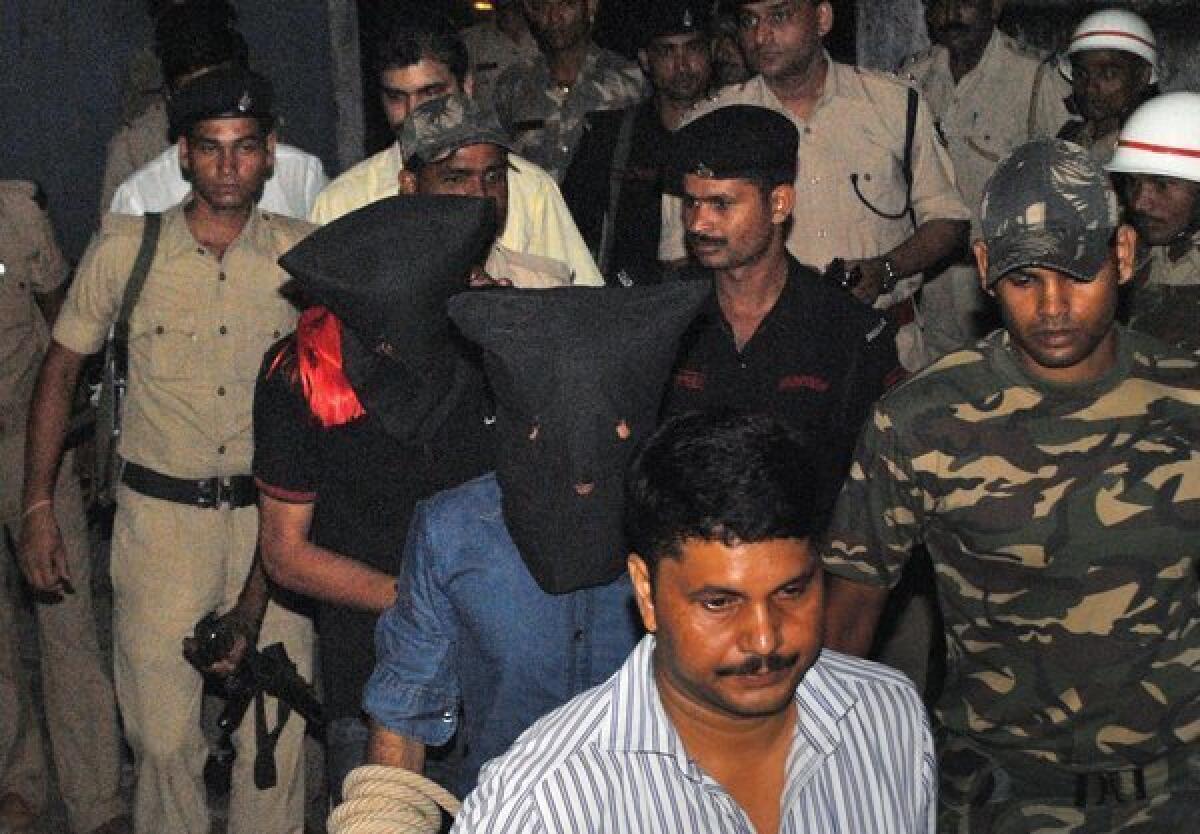Top Indian militant arrested on border with Nepal

MEERUT, India â A militant who topped Indiaâs most-wanted list and helped found one of the nationâs most infamous homegrown insurgent groups was apprehended on the border with Nepal, police said Thursday.
Yasin Bhatkal, 30, mastermind and a co-founder of the Indian Mujahedin, is wanted in connection with more than 40 bombings over the last decade.
Bhatkal â born Mohammed Ahmed Siddhibappa but widely known by his pseudonym â was tracked to Nepal by Indian intelligence agencies. The agencies negotiated with Katmandu to have him taken to their shared border, where he was formally arrested Wednesday night, Indian news reports said, quoting government sources. Police announced his arrest Thursday.
Bhatkal is being interrogated amid heightened security concern in the northern state of Bihar, said state police chief Abhayanand, who goes by one name. He is expected to be transferred Friday to New Delhi. News reports said that another member of his group, Asadullah Akhtar, alias Haddi, was also captured.
Indian security agencies were treating the arrest as a major breakthrough in their bid to destroy the banned Indian Mujahedin, which is accused of being behind bombings in Mumbai, Delhi, Hyderabad, Bangalore, Ahmedabad, Pune and Jaipur in recent years.
Television video showed the handcuffed suspect, in a blue shirt and a black mask, emerging from a white SUV.
Bhatkal, who is believed to have helped provide training, money and materiel for attacks around the country, was using an assumed name and a Pakistani passport and was en route to Bangladesh to meet contacts when he was caught, Indian news reports said, citing intelligence sources. He has been on the run for five years.
Security analysts said the capture was significant, but not a knockout blow to the Indian Mujahedin.
âThe glory days of an organization donât end with one capture,â said Ajit Kumar Doval, former director of Indiaâs Intelligence Bureau. âBut itâs a way to slow things down.â
Bhatkal was born in a small coastal town of the same name in the southern state of Karnataka. He studied engineering in high school, and reportedly teamed up with seven friends and relatives in 2003 to found the Indian Mujahedin.
Newspapers, citing security agency sources, said Bhatkal has been operating in India, though many of his colleagues have taken refuge in Pakistan. The bombings he is suspected of helping carry out include one in the German Bakery in Pune in 2010 that killed 17 people, and coordinated bomb blasts in July 2011 in Mumbai that killed 27 and wounded 130. Numerous state and federal anti-terrorism agencies are lining up to interrogate him about attacks in which he is suspected.
Indiaâs intelligence agencies are doing a good job countering militancy, despite a shortage of staff and the lack of centralized national crime database, aided by improved cooperation by neighboring countries, analysts said.
âThose days are gone when terrorists got an easy ticket to Dubai, where they went for fun and a holiday, then slipped back into India across the Nepal or Bangladesh borders,â said Ajai Sahni, executive director of New Delhiâs Institute of Conflict Management. âWest Asia is becoming more sympathetic to Indiaâs problems.â
Bhatkal, dubbed âthe ghost who bombs,â enhanced his reputation by repeatedly eluding security agencies in a series of close calls. In 2009, he was arrested in West Bengal state in a fake currency case, but managed to secure bail and disappear before police figured out who he was.
The Indian Mujahedin is thought to oversee a network of semi-autonomous home-grown Islamic militant cells in India. Some analysts believe it has links to the Pakistan-based Lashkar-e-Taiba and Jaish-e-Mohammed militant organizations.
The organization has never been huge, former intelligence official Doval said, and its ideology has never gained widespread traction, although it has enjoyed support in pockets. Washington added the Indian Mujahedin to its list of foreign terrorist organizations in 2011.
On Aug. 16, Indian intelligence arrested another suspected top militant, Abdul Karim Tunda, who is believed to be a senior Lashkar-e-Taiba member and bomb expert.
ALSO:
U.S. would rely on missiles in a strike on Syria
Freed Mexico drug lord Caro Quintero got a huge head start
Why Syriaâs chemical weapons stockpile is safe from airstrikes
Twitter: @markmagnier
Special correspondent Sharma reported from Meerut and Times staff writer Magnier from Kabul, Afghanistan.
More to Read
Sign up for Essential California
The most important California stories and recommendations in your inbox every morning.
You may occasionally receive promotional content from the Los Angeles Times.








